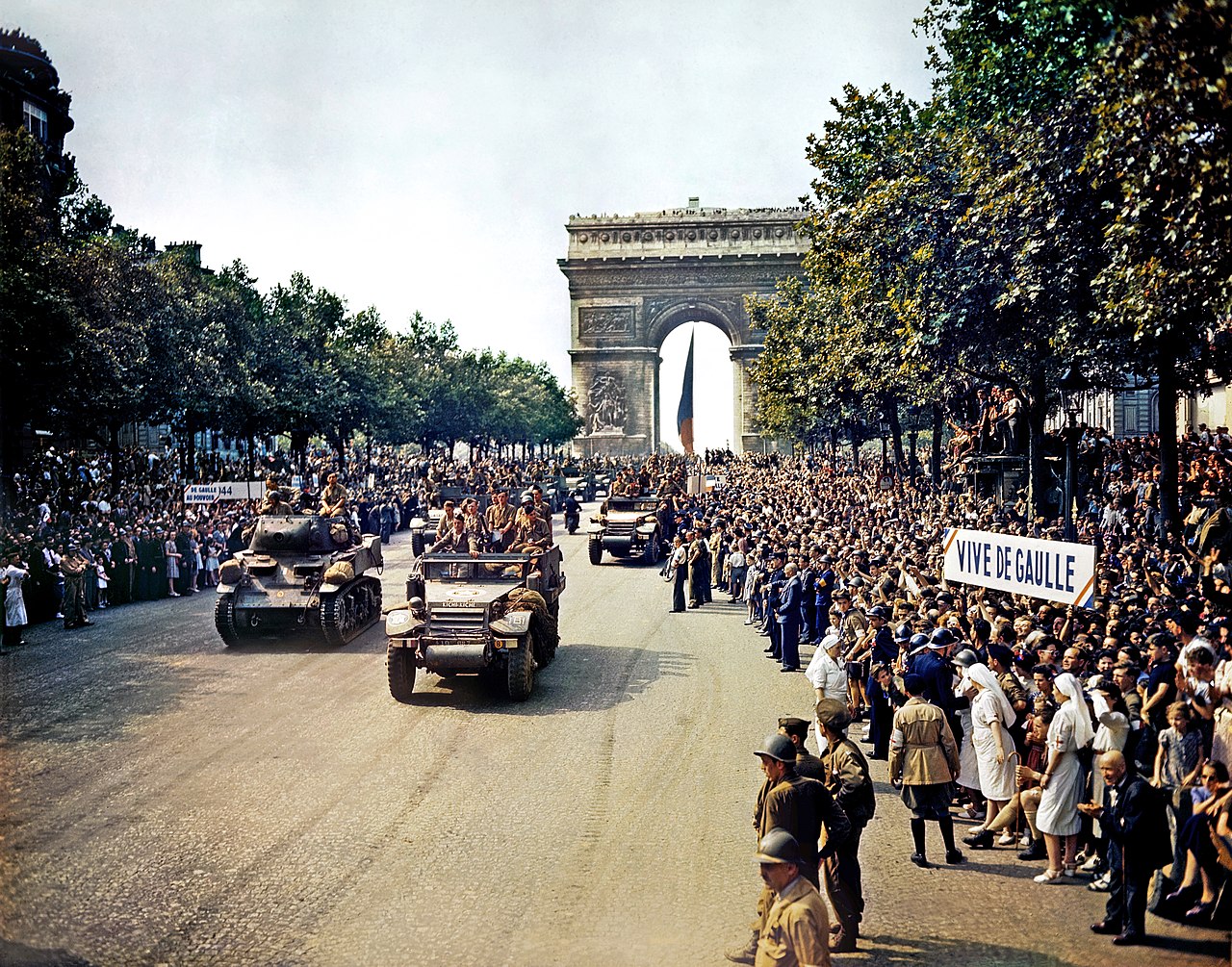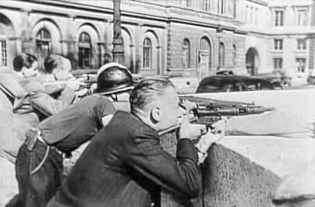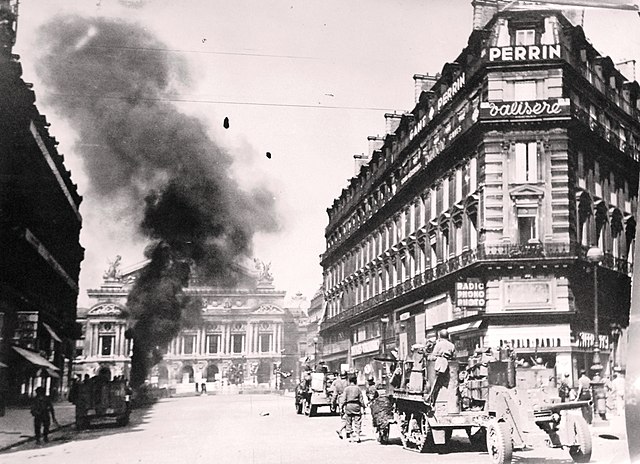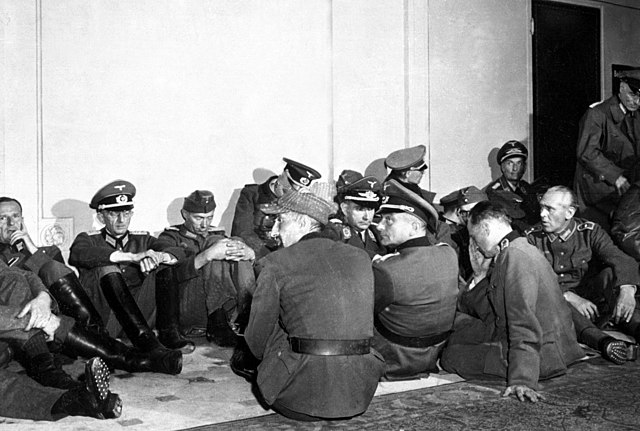General Discussion
Related: Editorials & Other Articles, Issue Forums, Alliance Forums, Region Forums75 Years Ago Today; The Liberation of Paris

The Liberation of Paris (also known as the Battle for Paris and Belgium; French: Libération de Paris) was a military battle that took place during World War II from 19 August 1944 until the German garrison surrendered the French capital on 25 August 1944. Paris had been ruled by Nazi Germany since the signing of the Second Compiègne Armistice on 22 June 1940, after which the Wehrmacht occupied northern and western France.
The liberation began when the French Forces of the Interior—the military structure of the French Resistance—staged an uprising against the German garrison upon the approach of the US Third Army, led by General George Patton. On the night of 24 August, elements of General Philippe Leclerc's 2nd French Armored Division made their way into Paris and arrived at the Hôtel de Ville shortly before midnight. The next morning, 25 August, the bulk of the 2nd Armored Division and US 4th Infantry Division entered the city. Dietrich von Choltitz, commander of the German garrison and the military governor of Paris, surrendered to the French at the Hôtel Meurice, the newly established French headquarters. General Charles de Gaulle of the French Army arrived to assume control of the city as head of the Provisional Government of the French Republic.
<snip>
Battle and Liberation
FFI uprising (19–23 August)

FFI uprising on 19 August. One skirmisher is wearing an Adrian helmet
All over France, from the BBC and the Radiodiffusion nationale (the Free French broadcaster) the population knew of the Allies' advance toward Paris after the end of the battle of Normandy. RN had been in the hands of the Vichy propaganda minister, Philippe Henriot, since November 1942 until de Gaulle took it over in the Ordonnance (he signed in Algiers on 4 April 1944).
On 19 August, continuing their retreat eastwards, columns of German vehicles moved down the Champs Élysées. Posters calling citizens to arm had previously been pasted on walls by FFI members. These posters called for a general mobilization of the Parisians, arguing that "the war continues"; they called on the Parisian police, the Republican Guard, the Gendarmerie, the Garde Mobile, the Groupe mobile de réserve (the police units replacing the army), and patriotic Frenchmen ("all men from 18 to 50 able to carry a weapon" ) to join "the struggle against the invader". Other posters assured that "victory is near" and promised "chastisement for the traitors", i.e. Vichy loyalists, and collaborators. The posters were signed by the "Parisian Committee of the Liberation", in agreement with the Provisional Government of the French Republic, and under the orders of "Regional Chief Colonel Rol" (Henri Rol-Tanguy), the commander of the French Forces of the Interior in the Île de France region. Then, the first skirmishes between the French and the German occupiers began. During the fighting, small mobile units of the Red Cross moved into the city to assist the French and Germans who were wounded. That same day in Pantin, a barge filled with mines was detonated by the Germans and destroyed the Great Windmills supplying flour to Paris.
On 20 August, as barricades began to appear, Resistance fighters organized themselves to sustain a siege. Trucks were positioned, trees cut down, and trenches were dug in the pavement to free paving stones for consolidating the barricades. These materials were transported by men, women, and children using wooden carts. Fuel trucks were attacked and captured. Civilian vehicles were commandeered, painted with camouflage, and marked with the FFI emblem. The Resistance used them to transport ammunition and orders from one barricade to another.
Skirmishes reached their peak on 22 August, when some German units tried to leave their fortifications. At 09:00 on 23 August, under Choltitz' orders, the Germans opened fire on the Grand Palais, an FFI stronghold, and German tanks fired at the barricades in the streets. Adolf Hitler gave the order to inflict maximum damage on the city.
It is estimated that between 800 and 1,000 Resistance fighters were killed during the Battle for Paris, and another 1,500 were wounded.
Allies enter Paris (24–25 August)
On 24 August, delayed by combat and poor roads, Free French General Leclerc, commander of the 2nd French Armored Division which were equipped with American M4 Sherman tanks, halftracks and trucks disobeyed his direct superior, American corps commander Major General Leonard T. Gerow, and sent a vanguard (the colonne Dronne) to Paris, with the message that the entire division would be there the following day. The 9th Company of the Régiment de marche du Tchad which was nicknamed La Nueve (Spanish for "the nine" ) consisted of 160 men under French command, 146 of which were Spanish republicans. They were commanded by French Captain Raymond Dronne, who became the second uniformed Allied officer to enter Paris after Amado Granell.
At 9:22 p.m. on the night of August 24, 1944, the 9th Company broke into the center of Paris by the Porte d'Italie. Upon entering the town hall square, the half-track "Ebro" fired the first rounds at a large group of German fusiliers and machine guns. Civilians went out to the street and sang "La Marseillaise". The leader of the 9th Company, Raymond Dronne, went to the command of the German general Dietrich von Choltitz to request the surrender.
The 4th US Infantry Division commanded by Raymond Barton also entered through the Porte d'Italie in the early hours of the next day. The leading American regiments covered the right flank of the French 2nd Armoured and turned Eastward at the Place de la Bastille and made their way along Avenue Daumesnil heading towards the Bois de Vincennes. In the afternoon the British 30 Assault Unit had entered the Porte d'Orléans and then searched buildings for vital intelligence, later capturing the former Headquarters of Admiral Karl Dönitz, the Château de la Muette.
While awaiting the final capitulation, the 9th Company assaulted the Chamber of Deputies, the Hôtel Majestic and the Place de la Concorde. At 3:30 p.m. on August 25, the German garrison of Paris surrendered and the Allies received Von Choltilz as a prisoner, while other French units also entered the capital.
Near the end of the battle, Resistance groups brought Allied airmen and other troops hidden in suburban towns, such as Montlhéry, into central Paris. Here, they witnessed the ragged end of the capital's occupation, de Gaulle's triumphal arrival, and the claim of "One France" liberated by the Free French and the Resistance.
The 2nd Armored Division suffered 71 killed and 225 wounded. Material losses included 35 tanks, six self-propelled guns, and 111 vehicles, "a rather high ratio of losses for an armored division", according to historian Jacques Mordal.
German surrender (25 August)

August 25 - Armoured vehicles of the 2nd Armored (Leclerc) Division fighting before the Palais Garnier. One German tank is going up in flames
Despite repeated orders from Adolf Hitler that the French capital "must not fall into the enemy's hand except lying in complete debris", which was to be accomplished by bombing it and blowing up its bridges, Choltitz, as commander of the German garrison and military governor of Paris, surrendered on 25 August at the Hôtel Meurice. He was then driven to the Paris Police Prefecture where he signed the official surrender, then to the Gare Montparnasse, Montparnasse train station, where General Leclerc had established his command post, to sign the surrender of the German troops in Paris. Choltitz was kept prisoner until April 1947. In his memoir Brennt Paris? ("Is Paris Burning?" ), first published in 1950, Choltitz describes himself as the saviour of Paris.
In a 1964 interview, Choltitz claimed that he had refused to obey Hitler's orders: "If for the first time I had disobeyed, it was because I knew that Hitler was insane". According to a 2004 interview, which his son Timo gave to the French public channel France 2, Choltitz disobeyed Hitler and personally allowed the Allies to take the city safely and rapidly, preventing the French Resistance from engaging in urban warfare that would have destroyed parts of the city.
De Gaulle's speech (25 August)
On 25 August, the same day that the Germans surrendered, Charles de Gaulle, President of the Provisional Government of the French Republic, moved back into the War Ministry on the Rue Saint-Dominique. He made a rousing speech to the crowd from the Hôtel de Ville.
Why do you wish us to hide the emotion which seizes us all, men and women, who are here, at home, in Paris that stood up to liberate itself and that succeeded in doing this with its own hands?
No! We will not hide this deep and sacred emotion. These are minutes which go beyond each of our poor lives. Paris! Paris outraged! Paris broken! Paris martyred! But Paris liberated! Liberated by itself, liberated by its people with the help of the French armies, with the support and the help of all France, of the France that fights, of the only France, of the real France, of the eternal France!
Since the enemy which held Paris has capitulated into our hands, France returns to Paris, to her home. She returns bloody, but quite resolute. She returns there enlightened by the immense lesson, but more certain than ever of her duties and of her rights.
I speak of her duties first, and I will sum them all up by saying that for now, it is a matter of the duties of war. The enemy is staggering, but he is not beaten yet. He remains on our soil.
It will not even be enough that we have, with the help of our dear and admirable Allies, chased him from our home for us to consider ourselves satisfied after what has happened. We want to enter his territory as is fitting, as victors.
This is why the French vanguard has entered Paris with guns blazing. This is why the great French army from Italy has landed in the south and is advancing rapidly up the Rhône valley. This is why our brave and dear Forces of the interior will arm themselves with modern weapons. It is for this revenge, this vengeance and justice, that we will keep fighting until the final day, until the day of total and complete victory.
This duty of war, all the men who are here and all those who hear us in France know that it demands national unity. We, who have lived the greatest hours of our History, we have nothing else to wish than to show ourselves, up to the end, worthy of France. Long live France!

German soldiers at the Hôtel Majestic, headquarters for the Militärbefehlshaber in Frankreich, the German High Military Command in France. They requested that they be made prisoner only by the military and surrendered to Battalion Chief Jacques Massu of the 2e DB.
Victory parades (26 and 29 August)
The day after de Gaulle's speech, Leclerc's French 2nd Armored Division paraded down the Champs-Élysées. A few German snipers were still active, and ones from rooftops in the Hôtel de Crillon area shot at the crowd while de Gaulle marched down the Champs Élysées and entered the Place de la Concorde.

General de Gaulle and his entourage proudly stroll down the Champs Élysées to Notre Dame Cathedral for a Te Deum ceremony following the city's liberation on 25 August 1944.

A British AFPU photographer kisses a child before cheering crowds in Paris, 26 August 1944

As allied troops enter Paris on August 26, celebrating crowds on place De La Concorde scatter for cover from small bands of remaining German snipers.

The U.S. 28th Infantry Division on the Champs Élysées in the "Victory Day" parade on 29 August 1944.

American soldiers look at the French tricolour flying from the Eiffel Tower
On 29 August, the U.S. Army's 28th Infantry Division, which had assembled in the Bois de Boulogne the previous night, paraded 24-abreast up the Avenue Hoche to the Arc de Triomphe, then down the Champs Élysées. Joyous crowds greeted the Americans as the entire division, men and vehicles, marched through Paris "on its way to assigned attack positions northeast of the French capital."
</snip>
Viva La Allies! Viva La France!
CTyankee
(63,912 posts)Was there ever a movie made about the liberation itself? It is such a marvelous story...
DinahMoeHum
(21,794 posts)Sherman A1
(38,958 posts)Bernardo de La Paz
(49,010 posts)rurallib
(62,423 posts)He just never talked about his war experience.
He was part of the D-day invasion. I got that much out of him.
Then once when an ad for the Red Cross came on TV he kind of lost it. He said 'One day I was walking in Paris and someone asked me if I wanted a cup of coffee. I was in my uniform. It was the Red Cross. She wanted me to pay a dime for that cup of coffee. I'll be damned if I was going to pay for a cup of coffee after risking my life to free that city.'
That was about all we could ever get out of him. An occasional snippet when something triggered a memory.
He was really bitter about the Red Cross.
femmocrat
(28,394 posts)I just finished watching “A French Village” on Netflix DVDs. There are seven seasons. It takes place during the occupation from 1940-45 in a fictional French village.
It is wonderful and I learned so much about that time.
Here’s a link if anyone thinks they would enjoy watching it: https://www.imdb.com/title/tt1288631/
NNadir
(33,526 posts)I do recall one time when I happened to be in Paris on VE day. Mitterand was President at the time, and I strolled down the Champs D'Elysees toward the Arc de Triomphe as Mitterand was driving up to lay a wreath in the midst of a huge military parade.
Hanging from the Arc was this huge banner photograph of bombers in the sky. I kidded my good French friends afterwards, describing the banner and asked them how many of those bombers were French.
DeGaulle's speech, reproduced here, reminded me of that. He did mention the allies, briefly. He was quite a character.
I have seen a lecture by a historian on the subject of the liberation of France that stated that many of the French were extremely outraged by the American bombing of occupied France, and the fact that ancient cities like Caen were effectively destroyed both by bombing and combat.
France however, is one of the most beautiful countries in the world, and the French are far our superiors in knowing how to live. Generally, with some faults, as all cultures have, they are a great and wonderful people. I love them dearly.
oldsoftie
(12,558 posts)so long ago.
2 uncles were there, separately
FakeNoose
(32,645 posts)Thanks for these great commemorative posts you're doing Dennis Donovan.
![]()
![]()
![]()